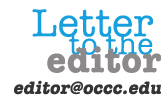Prof speaks out about HB 1551


To the Editor:
State Rep. Kern and State Sen. Breechen have recently introduced legislation (HB 1551, SB 554, respectively), addressing the methods and philosophy of teaching “controversial’’ scientific topics including evolution and global warming.
Breechen’s bill in particular contains specific curricular adoptions lifted directly from the Texas state science standards adopted there in 2009.
These were widely ridiculed by no fewer than 54 scientific and educational societies.
His stated goal as late as this last December was to “ … teach the debate of creation vs. evolution using the known science, even that which conflicts with Darwin’s religion.”
Both bills guard against persecution of students or teachers that present such scientific evidence that contradicts the current models, but examples of such evidence is never presented.
The strategy of such legislative efforts has changed over time. After brazenly unconstitutional initial efforts failed in courts in other states, current bills utilize a “wedge’’ strategy to use reasonable language and innuendo to foster the impression that a legitimate scientific debate is not being fairly considered.
Ought we promote an environment of critical thinking and a presentation of scientific evidence? Absolutely.
The importance of questioning and modifying models over time should be a large component of any science class.
In singling out particular theories these legislators feel are controversial, however, they are attempting to foment mistrust in the scientific enterprise itself.
Nearly universally, experts who spend their lives researching and investigating these fields emphatically report that there is no controversy.
The model explaining that all extant species share common ancestors in the past is beyond reasonable dispute and is independently supported by biology, nuclear physics, geology, astronomy, chemistry, and molecular genetics.
Where is any scientific evidence against the common ancestry of species (or global warming, for that matter) that they would like to see presented and that hasn’t been thoroughly refuted?
We have truly regressed again to the medieval if we allow rank amateurs and politicians who can’t be bothered to learn the science in the first place to encourage confusion and suspicion of standard explanations they don’t particularly like.
The right authority to correct scientific theories is science and scientists themselves, not a legislative end-run attempting to legitimize fashionable ideas.
Science expands our understandings of the possible, and the universe exists outside of our imaginations.
If we allow the power of science to be constrained by our personal incredulity, we inevitably succumb to a hubris of ignorance.